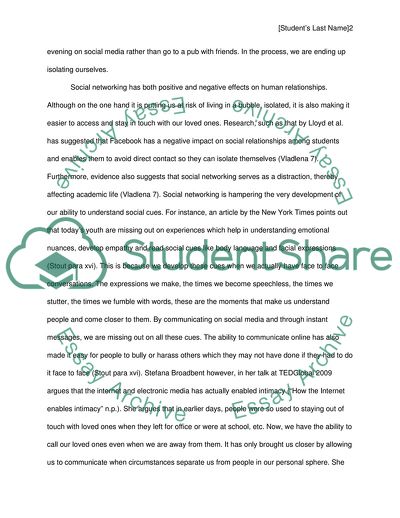Cite this document
(The Isolating Effect of Social Media Essay Example | Topics and Well Written Essays - 1250 words, n.d.)
The Isolating Effect of Social Media Essay Example | Topics and Well Written Essays - 1250 words. https://studentshare.org/journalism-communication/1852981-are-we-increasingly-at-risk-of-living-in-a-bubble-world-due-to-social-media-and-electronic-communication-in-other-words-what-are-the-positive-and-negative-impacts-of-social-networking-on-human-relationships-are-we-at-risk-of-losing-the-capa
The Isolating Effect of Social Media Essay Example | Topics and Well Written Essays - 1250 words. https://studentshare.org/journalism-communication/1852981-are-we-increasingly-at-risk-of-living-in-a-bubble-world-due-to-social-media-and-electronic-communication-in-other-words-what-are-the-positive-and-negative-impacts-of-social-networking-on-human-relationships-are-we-at-risk-of-losing-the-capa
(The Isolating Effect of Social Media Essay Example | Topics and Well Written Essays - 1250 Words)
The Isolating Effect of Social Media Essay Example | Topics and Well Written Essays - 1250 Words. https://studentshare.org/journalism-communication/1852981-are-we-increasingly-at-risk-of-living-in-a-bubble-world-due-to-social-media-and-electronic-communication-in-other-words-what-are-the-positive-and-negative-impacts-of-social-networking-on-human-relationships-are-we-at-risk-of-losing-the-capa.
The Isolating Effect of Social Media Essay Example | Topics and Well Written Essays - 1250 Words. https://studentshare.org/journalism-communication/1852981-are-we-increasingly-at-risk-of-living-in-a-bubble-world-due-to-social-media-and-electronic-communication-in-other-words-what-are-the-positive-and-negative-impacts-of-social-networking-on-human-relationships-are-we-at-risk-of-losing-the-capa.
“The Isolating Effect of Social Media Essay Example | Topics and Well Written Essays - 1250 Words”. https://studentshare.org/journalism-communication/1852981-are-we-increasingly-at-risk-of-living-in-a-bubble-world-due-to-social-media-and-electronic-communication-in-other-words-what-are-the-positive-and-negative-impacts-of-social-networking-on-human-relationships-are-we-at-risk-of-losing-the-capa.


